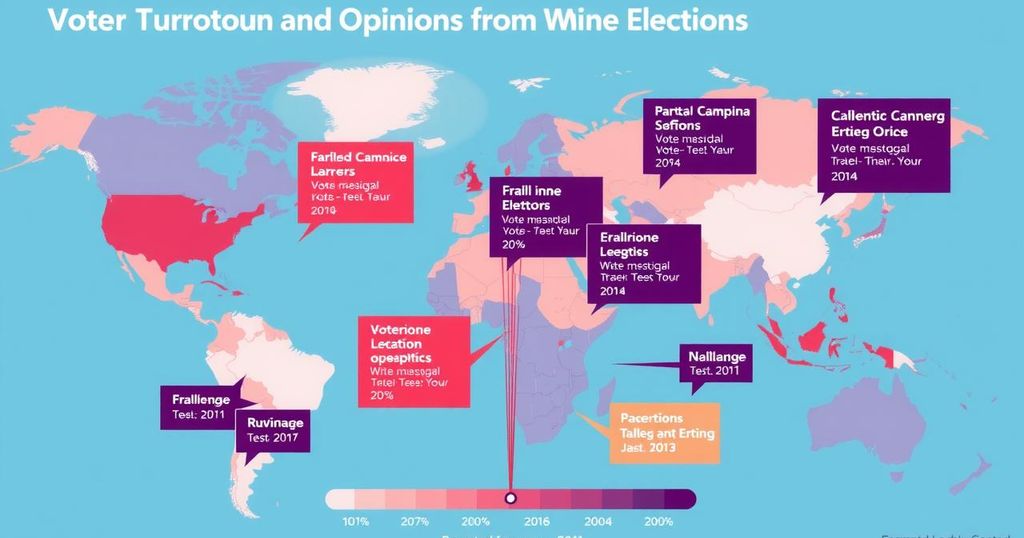Global Democracy in 2024: A Year of Votes and Lessons Learned
In 2024, half the world voted in elections across over 60 countries, marking a historic moment for democracy. The results revealed a tendency for voters to prioritize immediate economic concerns over broader collective issues, such as climate change. Political leaders faced varying outcomes, with incumbents like Biden and Modi experiencing backlash, while new populist forces emerged. Putin’s authoritarian grip highlighted the challenges of genuine democratic practices worldwide, underscoring the complexities of global governance and its future.
In 2024, nearly half the world participated in elections, marking a significant moment for global democracy as over 60 countries chose their leaders. Despite this historic engagement, the outcomes appeared to reflect persistent self-interest among voters, focusing on immediate economic concerns rather than long-term collective challenges like climate change. Election results indicated a trend of voting primarily motivated by fear and personal welfare, as seen in industrialized nations such as the United Kingdom where economic issues dominated priorities.
For instance, Keir Starmer’s Labour Party achieved a landslide victory over the Conservatives by capitalizing on economic dissatisfaction that stemmed from inflation and stagnant wages under the previous administration. Similarly, President Biden faced backlash in the United States despite reducing inflation, as voters expressed their frustrations through the ballot, reinstating Donald Trump.
Contrary to expectations, leaders with populist agendas, such as India’s Narendra Modi and South Africa’s ANC, experienced declines in support, highlighting a shift in the political landscape. Votes from various cornerstones of democracy, from Algeria to Taiwan, demonstrated a collective movement towards engaging with democratic processes, yet the underlying issues of governance and accountability persisted.
A notable case was Vladimir Putin’s overwhelming electoral victory in Russia, which illustrated a lack of true democratic practice, marked by the persecution of opposition figures and media control. On the other side of the spectrum, Emmanuel Macron’s call for an immediate parliamentary election post-EU elections exemplified an effort to counterbalance rising populism, despite his government’s cautious success.
The elections of 2024 showcased the complexity of global democratic processes, revealing a troubling tendency to prioritize short-term economic survival over long-term stability, particularly regarding existential threats like climate change. The significance of this year’s electoral results extends beyond borders, influencing global dynamics in governance and international relations, which will likely impact future democratic engagements.
The year 2024 was remarkable for global democracy, seeing an unprecedented number of countries participating in elections, collectively representing nearly half the world’s population. This engagement posed a key question: did voters prioritize their interests over collective challenges? The historical context reveals a dual narrative of aspiration for democratic ideals and the reality of navigating the immediate concerns of economic survival, highlighting the persistent tensions in democratic societies around the world. Recent global events have further complicated voter priorities, particularly as economic challenges from crises like the COVID-19 pandemic and geopolitical tensions, such as the war in Ukraine, continued to shape public perception and political priorities.
The electoral activities of 2024 illuminated the dual realities of democracy—an eagerness for participation juxtaposed against a troubling inclination for self-serving choices that neglect the collective good. While many leaders faced accountability through voter action, the overarching themes of fear, economic struggle, and the pull of populism signal a critical juncture for democracy worldwide. The outcomes not only reflect individual nations’ sentiments but also highlight the interconnectedness of global democratic practices and the rippling consequences of local electoral decisions on an international scale.
Original Source: edition.cnn.com




Post Comment